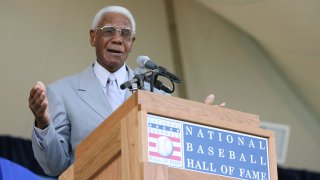
How Cubs might gain Hall of Famer with Negro Leagues recognition originally appeared on NBC Sports Chicago
Will this week’s formalized recognition of the Negro Leagues as a “major league” alongside the National and American help the Cubs add to its all-time roster of Hall of Famers?
“It certainly doesn’t hurt his case, that’s for sure,” said Bob Kendrick, president of the Negro Leagues Baseball Museum in Kansas City and perhaps the leading authority on the history of those segregated leagues.
Kendrick was referring to Buck O’Neil, the former Cubs coach and scout, whose signings included Hall of Famer Billy Williams and Oscar Gamble, and whose Negro League career included 11 seasons as a defensively elite, All-Star first baseman and eight seasons as a manager (much of that as player-manager).
Kendrick said he expected O’Neil and former White Sox great Minnie Minoso, along with former Sox MVP Dick Allen, to all have strong chances to be voted by the veterans committee this year until the vote was postponed to next year because of COVID-19.
O’Neil, who gained national notoriety in the 1990s as a major figure in Ken Burns’ Baseball series, spent four underrated years as a Cubs coach in the 1960s, a major competitive and developmental influence behind the scenes even while denied base coaching duties and a manager turn during the ill-fated “college of coaches” experiment.
O’Neil missed by one vote election to the Hall of Fame through a special Negro Leagues committee in 2006 — the year he died, at 94, in Kansas City, where he played and managed most of his career.
If this week’s formal recognition of the Negro Leagues is worth even a small boost to the perception of his accomplishments, then O’Neil — whose autobiography is titled I Was Right On Time — might finally have found his moment for the long-deserving personal recognition.
Maybe that will be part of the value of MLB’s decades-overdue recognition of a group of teams and players that needed no validation from the historically racist institution that kept them out of the National and American League until Jackie Robinson — even as they played, and often lost, exhibition games to teams of Negro League players.
Kendrick, whose first reaction to MLB’s so-called (and inaccurately termed) “elevation” of the Negro Leagues to “major league” status was “we don’t need you to validate us,” quickly came around to the potential value as an historical marker for future generations learning about the Leagues and its players for the first time.
And maybe even the potential value of opening larger conversations of some overlooked Hall of Fame candidates such as O’Neil.
“I have to prepare myself mentally and emotionally for what happens if he doesn’t get in. Man, it was excruciating the last time,” Kendrick said during a lengthy discussion about Wednesday's news on the Cubs Talk Podcast. “It was draining. And I knew it was draining for him as well because he had to constantly answer the questions about why he didn’t get in. He was like, ‘Hell, I don’t know why I didn’t get in.’
“But we’re excited about it,” Kendrick added. “For his fans, who have been so vigilant about the fact that he belongs in the Hall of Fame, that would be a level of vindication. For me, we wanted it to happen in 2006 so that we could celebrate with our guy, so that we could high-five and bump chests with our guy.
“Buck has been gone now for 14 years, and his fans have remained just as adamant about him deserving to be included among the greats of the greats of the Hall of Fame as they were in 2006. And there’s no way I could not be happy for them.”
Of course if it does happen next year, the Cubs might have to settle for O’Neil being a Hall of Fame Cub the same way Dizzy Dean or Lou Brock (another O’Neil scouting discovery) is a Hall of Fame Cub.
He would almost certainly be enshrined in his rightful place with the Kansas City Monarchs cap in its rightful place on his plaque.




